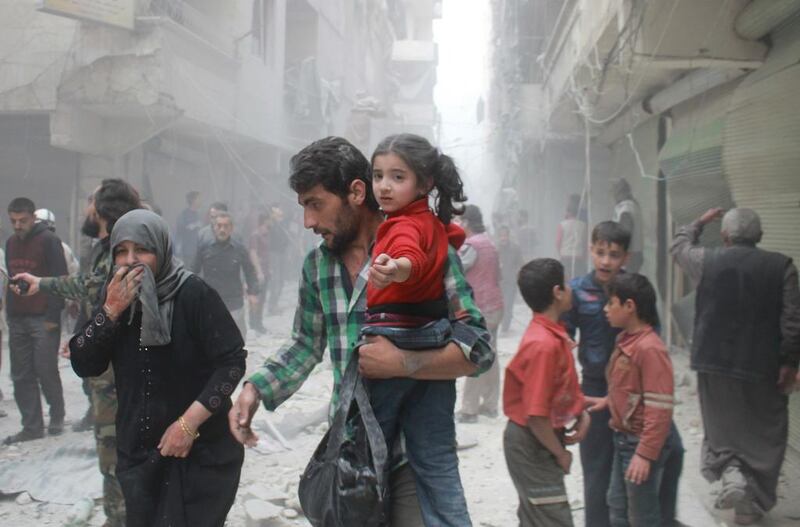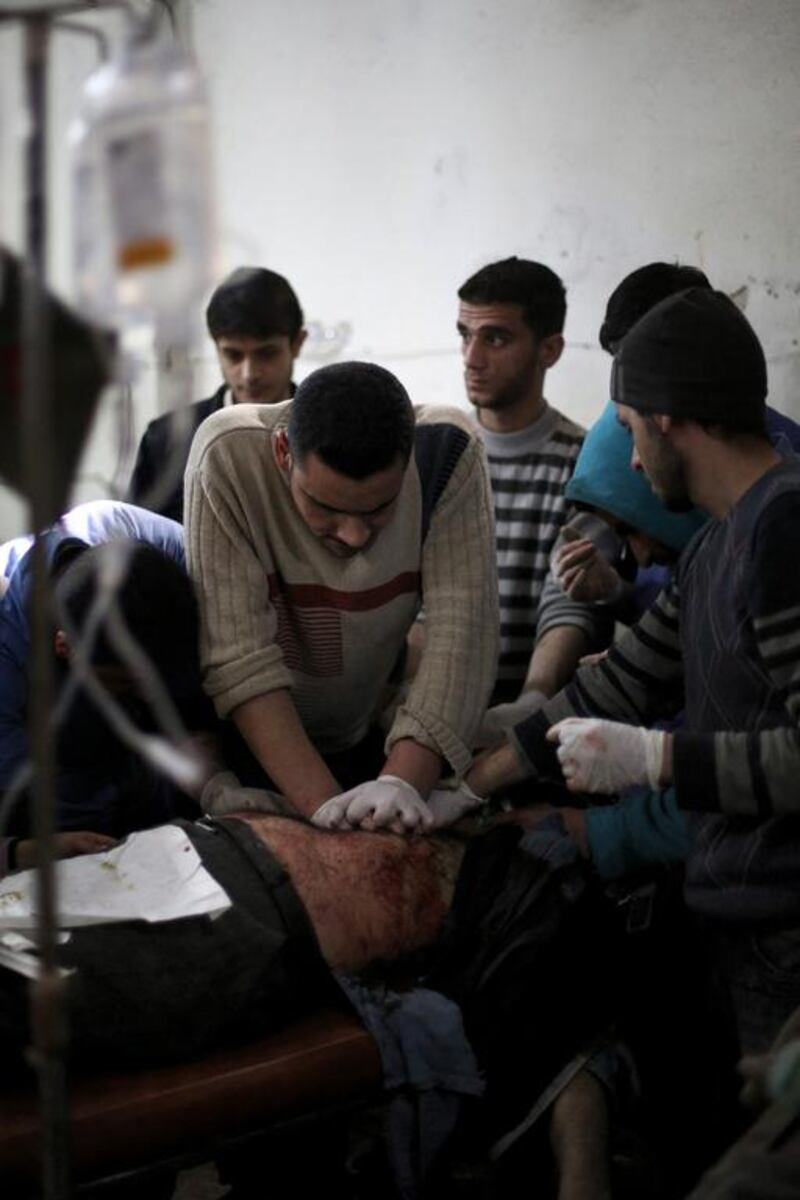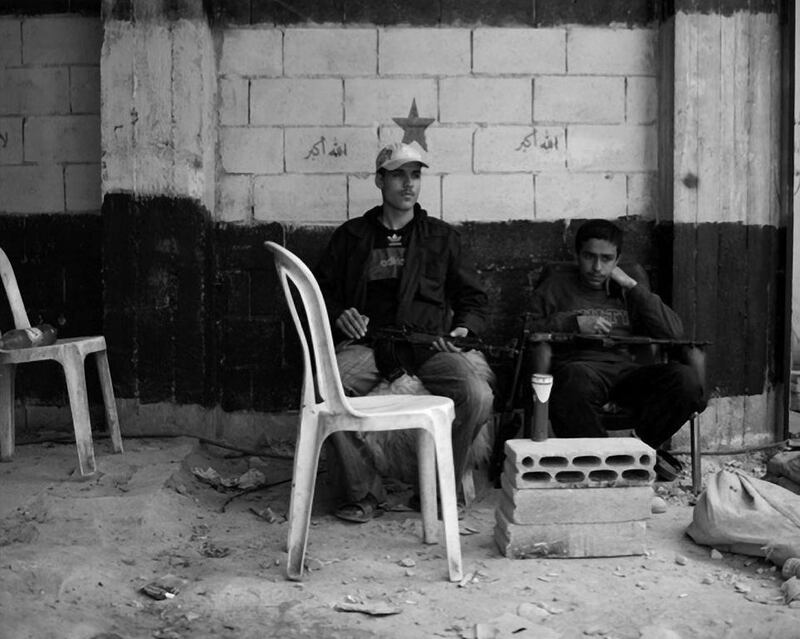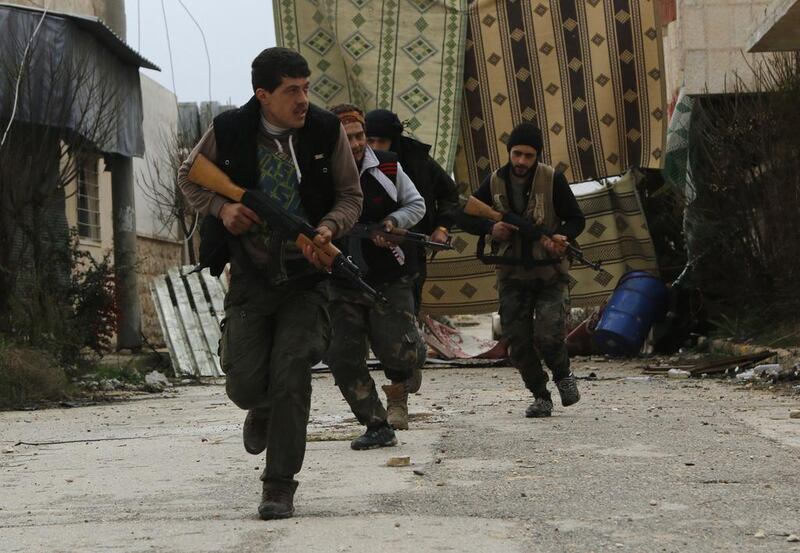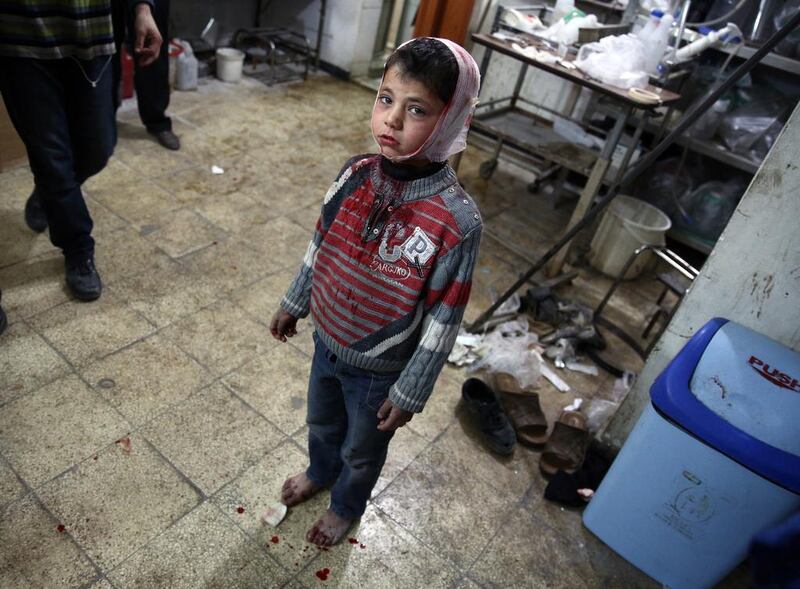It was three years ago this month that I went to Homs on a medical-aid run. It was April 2012, a United Nations ceasefire had just started and it was being utterly ignored by forces loyal to President Bashar Al Assad. From a military compound next to the main highway, they were firing artillery shells into the Khalediyeh neighbourhood several kilometres to the north, a shameless violation of the peace terms they had agreed to and reminder, if one were needed, of the embarrassing impotence of the UN in the face of an outrageous slaughter.
I was travelling to Homs with some Syrians who were smuggling medical supplies into the areas inhabited by civilians and controlled by armed rebels, which were right then being blown up by the regime. We had stopped to get fuel and coffee in a dilapidated service station, just across the road from the firebase, and we listened to the shells exploding out of the gun barrels; each blast would shake the windows and make us all flinch.
Because it was Syria, everyone getting fuel or food pretended not to hear anything. President Assad had said he was not violating the ceasefire, and was still denying using artillery and aircraft to, as one astute and well-connected observer in Damascus had earlier put it to me, “destroy a generation” that had dared to challenge his family’s five-decade rule. Fearing the mukhabarat – the loathed secret police – people were behaving as if that official story, the official lie, was true, even as the artillery rounds boomed out a few hundred metres away.
We were heading north towards the neighbourhood where those shells were landing, and, as the coffee brewed, all of us were having second thoughts. The journey had begun 160 kilometres away in the capital, my travelling companions loading their small car with a meagre but difficult-to-come-by stash of simple drugs plus a few bags of blood and some IV drip solution.
There wasn’t much of a plan, beyond trying to get help to people who needed it. They were depending mainly on luck, which seemed like a lot to ask in such luckless circumstances, to carry us all safely through military checkpoints, shellfire and snipers.
Medical supplies were, and continue to be today, viewed as a weapon of war by the Syrian authorities, a crude stick with which to beat the population back into submission. From the very start of the uprising, in March 2011, unarmed, peaceful protesters shot by the security forces learnt not to go to government-run hospitals, where they would be dragged from treatment tables and interrogated, thrown in jail or left to die. Better to bleed to death at home.
Throughout the years of uprising-turned-war, international aid agencies wanting to get life-saving help into towns under military siege have been deliberately and systematically blocked from doing their work by the authorities. Occasionally they are allowed in, just frequently enough to keep them interested, but not often enough to do their jobs fully.
Most learnt not to talk publicly about this, and it’s still something many humanitarian organisations working in Syria are, rightly or wrongly, coy about; their access is often controlled by the regime and they worry that open criticism will only get them expelled. By keeping silent and cooperating with the regime, they get to help some people, whereas if they speak out and get thrown out, they will be unable to get access and unable to help anyone. Those are the unsavoury compromises this war has required.
With no official aid allowed into Homs and with the big international bodies, such as the UN and Red Cross, not granted the access they needed, small bands of Syrian volunteers stepped into the breach, collecting money, buying supplies and running the gauntlet to get them to their wounded fellow countrymen. The risks were enormous; medicine smugglers were treated as terrorists, enemies of the state, every bit as much as those who had taken up weapons against the regime.
I went along on the Homs trip largely out of frustration. I’d been in Syria for several years, and the air was thicker than ever with misinformation, lies and misunderstanding. I was trying to do my job as a reporter, trying to actually see what was going on, rather than listen to other people giving their accounts of things I’d not seen. Every bit as much as medicine, the regime was trying to control information and wouldn’t allow reporters to travel with any real freedom. I’d been left with no choice but to find alternative ways out of the Damascus bubble and into the war-ravaged rest of the country.
Our luck held that day, as we took the little car into Homs. Sick with nerves and holding our breath, we’d passed through a couple of army checkpoints and suddenly we were in the rebel-held zone, the shells roaring overhead. With a speed that would have been insanely reckless but for the snipers and the artillery fire, the driver took us through a no man’s land of torn cement, the city already a landscape of rubble and despair, and straight to a field hospital.
The word hospital is misleading to anyone who has been to even a third-rate modern clinic; it wasn’t a medical facility in any real sense, rather an ad hoc triage centre where the wounded went to die because the volunteer medical staff had nothing to treat anyone with.
The supplies were handed over, and we went to look around the neighbourhood, passing rebel fighting positions. They were threadbare, poorly armed and desperately ill-equipped. Most of the fighters, in what was still then known as the Free Syrian Army, were defectors, men from Assad’s armies who had refused to take part in the violent suppression of their own people.
A softly-spoken lieutenant, wearing his standard-issue combat fatigues and sandals, showed us around some bullet-scarred buildings and talked about his expectation that he would soon die. He wasn’t a fanatic and he very much wanted to live, to one day have a wife and family, he said. But if he had children, he wanted them to live in a free country, where the government wouldn’t gun them down or bomb them for having independent political views and aspirations. Like so many Syrians, he was an unwilling participant in a war that he hadn’t started.
Why is it worth mentioning any of this, now that it’s such ancient history? Now that the once-peaceful uprising has morphed into such an appalling war, now that ISIL is on the scene, now that the United States, and Russian, Iranian and Arab Gulf militaries are all so deeply involved in Syria’s perpetual disaster?
That single day in Homs – we drove out, racing back through no man’s land before sunset – is still relevant if only as a reminder that, for all of the complexity of Syria, and the deeply sectarian, regional proxy war now raging there, the underlying principles of it all are simple: people who had been denied any freedom of thought or expression for five decades dared to ask for those small things and, rather than listen and enact real reforms, their rulers declared war on them.
The regime’s long record of brutality – the secret police, the artillery, the torture and, later, of course, chemical weapons – has, predictably, bred a brutality among its opponents. In much mainstream media discourse, this now obscures the savagery of Syria’s rulers. Assad has no doubt killed more Syrians than ISIL has, but ISIL has killed more Americans than the regime, and that is what brought US air power into the war, not the regime’s chemical-weapons attacks.
It is true, also, that many of Syria’s liberals, its democrats, its progressives, seem to have fled the country now. Their voices, too, are increasingly drowned out by the head-severing atrocities of ISIL. Like the regime, ISIL uses food and medicine and aid workers, as weapons in its war.
Aid agencies are stuck between the devil and the deep blue sea, extremists on both sides; the Assad regime, restricting who receives aid and when, manipulating internationally funded handouts to bolster its support and harm its opponents. ISIL, with its maniacal mistrust of all things outside of itself, has similarly sought control of aid, and taken as hostages those involved in distributing it.
That day in Homs also aptly illustrates the failure of the UN to do anything meaningful about the war, a failure that continues. Here we are, three years later, and yet another UN envoy has struggled to put in place yet another ceasefire, this time in Aleppo.
This far into the war, it would be nice to be able to say that the worst is over, that conditions are at last improving. They are not. Quite the opposite; it is getting worse and there is no reason to believe the bloodshed will end any time soon. The longer it lasts, the deeper the extremism on both sides will become, and the more difficult it will be to rebuild a shattered society.
In Homs, soldiers loyal to the president had written: “Al Assad or we burn the country.” It was a slogan that appeared often, all over the country. It is certainly ablaze. Soon Syria will be nothing more than cinders.
Phil Sands is a former correspondent for The National in Damascus. He is now based in the US.
thereview@thenational.ae
